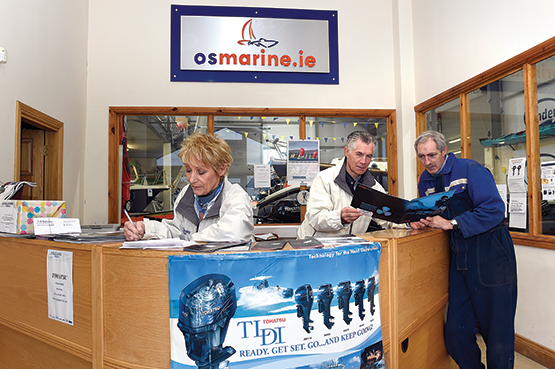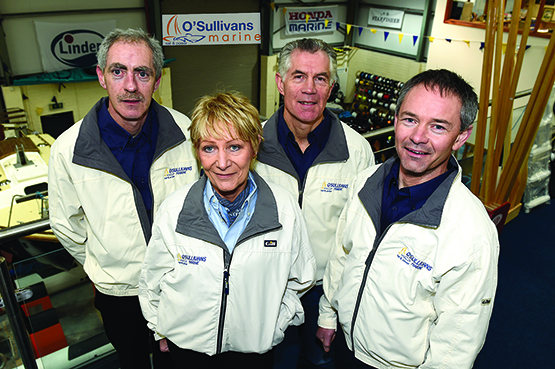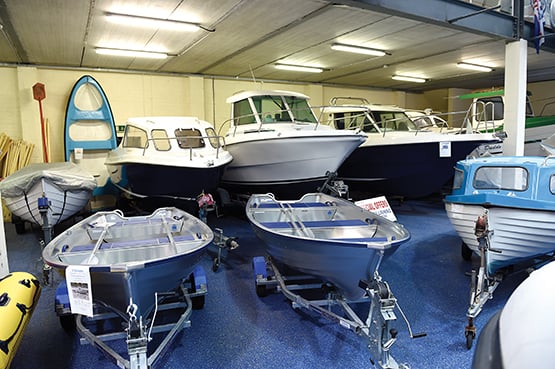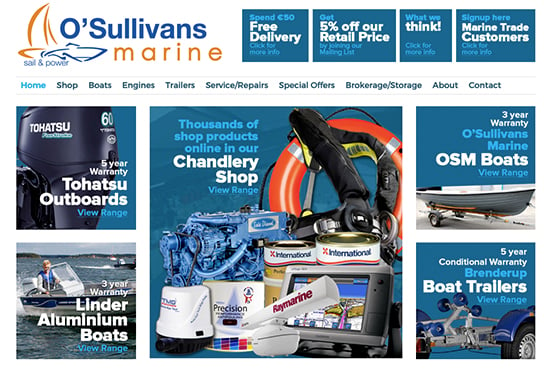Displaying items by tag: OSMarine
OSMarine: Business Development & Operations Manager Required
Position: Business Development and Operations Manager.
Location: Tralee, Co. Kerry.
Role: The business development and operations manager is a key leadership position within a fast-growing business in the marine industry.
The prime business of the company was boat building, but it has now added the distribution of several marine products, ranging from boats to outboard motors, boat trailers and marine safety equipment. This business is currently being developed at a quick pace within Ireland, with great potential to expand into other markets.
The purpose of this role is to develop and maintain key relationships with clients/customers by managing day-to-day operations to ensure client service level expectations are exceeded.
This role requires excellent management, communication, sales, leadership, staff supervision and customer service skills. Candidates are required to have a third level qualification relevant to the post. Knowledge of the marine industry is desirable, but not essential.
Finally, the candidate would be required to have the ability to be involved in all aspects of the business as we have a small but diverse team that works together to ensure best service to our customers and supply-chain.
CV’s and cover letters can be sent to [email protected]
O'Sullivan's Marine Turns the Tide
With expanded staff and premises, plus a brand new website and online offerings, the Tralee boatbuilders and dealers emerge from the storm of the recession ship-shape for the future
Wow, what a brutal storm. Even stronger for those further west!
Spinnaker up, absolutely flying along at well above hull design speed. Pushing hard, clinging on to the surfing waves, getting the most out of every surge. Everyone and everything working to the maximum limit, anticipating the next wave, the next sail change or even dropping that spinnaker, consider play safe or continue flat out. And then bang: that rogue wave, that slight misjudgment and it was crashing down around us.
In many ways, we realised very early on what was happening, but we could never have anticipated the extent of that crash. Who else did? Fortunately, we recovered quickly, assessed the situation as calmly as possible and planned the next steps. With a great crew on board, we managed to limber home, battened down the hatches, licked our wounds and came back fighting fit, ready to take on whatever was thrown at us.
That describes the economy in Ireland after September 2008 and what happened to most businesses, especially in the marine trade. We at O’Sullivans Marine were no different.
But we steadied the course, fixed what wasn’t perfect, trained up the crew, brought in new skill sets and were ship-shape once again.

Busy reception are at OSmarine.ie
History of O’Sullivans Marine
We have been around for over 50 years, and boy has that time gone by in a flash.
It all began in 1963 when Jerry O’Sullivan started the business and we built our first boat – which was in timber, believe it or not. Within two years we had already progressed to building our first fibreglass boat. And since then the business has moved several times, always getting bigger and more ambitious.
The staff grew, too. Jerry’s son Brian joined in 1978, coming home after college with the intention of staying around for a year or two. More than three decades later, he’s still an integral part of the team.
In 1980, we built a new factory on the outskirts of Tralee where we manufactured boats, but we still ran a shop in Tralee town centre. We subsequently moved everything marine in to that purpose-built development in 1990, with over 12,500 square feet of boat-building space, a service bay, offices and the marine shop.
Why Tralee? True, it’s not the centre of Ireland’s marine trade. The simple answer is that it’s a great place to live, but that’s not all. Coming from two large families in Kerry, both Jerry and his wife Noreen had strong connections all around them and, indeed, had several other business interests on the go at the time in Tralee. To relocate to a stronger market location might have made good business sense, but with a large family of their own, the thought was never really entertained.
In any case, Kerry has its own strong maritime traditions. Being a founder member of Tralee Bay Sailing Club in the late 1950s, Jerry had saltwater running through his veins, and to go into the marine business just seemed a natural progression.
By the time the 1990s were over, the aforementioned development outside Tralee proved too small once again. So out came the diggers to expand over the next seven years with up to 30,000 square feet of covered space with another 20,000 of outdoor storage space, along with a private car park, and still allowing room for further expansion. We completed that round of developments by May 2007 – probably not great timing in retrospect.
We have seen recessions before and probably will again, but we believe that the worst is over with this one, and we’re climbing back up the graph. We also believe that now is the time to prepare for the next phase and be ready for that filling tide. Reports confirm daily that Ireland is one of the fastest growing economies in Europe yet again, if not the fastest.
All the signs are positive, so we must be ready to catch the breeze as it picks up and avail of whatever opportunities come our way.
The USP of OSM
Our unique selling point here at O’Sullivans Marine is our very extensive selection of boats that we build here in Tralee, ranging in size from 2.5 to 8 metres.
Many of the ‘old reliables’ are still being built; they’re truly ageless. Take the 19’ Mayfly, for example, or the 18’ Sheelin. Several decades on, these boats are still in strong demand. And the major advantage these models have over other lake boats is the fact that they are all fibreglass with practically no timber above the waterline, so maintenance is minimal.
If a sea boat is more to your liking, we have quite a selection in stock and ready to order, both brand new and second-hand (and many available at special prices). All are fully certified and all pass with flying colours the requirements of the Recreational Craft Directive, the EU statutory regulation determining safety and build standards. Being CE certified, you can also rest assured all our craft are high-quality builds, safe and seaworthy.
All of this from a renowned boat-building yard that had 70 Cork 1720 sports yachts on the start line at Cork Week in 2000, some of which are still racing competitively throughout Ireland and abroad to this day. The same can be said for most of the leading boats in the National 18 class a few years later.
Now we are producing another racing craft: the Irish Coastal Rowing Federation’s own one–design coastal rowing yawl. This is a four-man (plus a coxswain) specialist coastal rower, proving extremely popular throughout the coast of Ireland. We build these to a high standard and to a strict weight tolerance and design.
Our steadfast crew
 OSM staff; Maurice O’Sullivan, Jo Quirke, Brian O’Sullivan and Thomas Gibney
OSM staff; Maurice O’Sullivan, Jo Quirke, Brian O’Sullivan and Thomas Gibney
We have reinforced our already excellent crew this year and are looking at some further reinforcements for 2016.
Thomas Gibney has been added to take charge of the technical IT side along with social media and other marketing roles. He joins our seasoned campaigner Maurice O’Sullivan, who has been integral to the team for over 30 years along with Jo Quirke, who has been and is at the front line for almost two decades now.
Brian O’Sullivan is our ever-present skipper at the helm and the main driving force behind the whole campaign. Born into the business, Brian has cut his teeth in the marine industry and still runs a tight and competitive ship.
This team is the backbone of the business, and with Sean, Bernard, Ian, John and David coming into the team with their complementary skill sets, this makes for a pretty formidable outfit in any situation.
Our loyal suppliers

Overview of some of OSM boats including some Linder Aluminium boats and OSM's Irish made 18’ Sheelin
At O’Sullivans Marine, we are fortunate to be able to count on several big names in the marine industry who have supported us over many years with the supply of excellent products.
We have long-established relationships with many leading brands in the business, such as Linder Aluminium Boats from Sweden; Gemini Ribs and inflatables from South Africa; Poseidon Boats from Greece; Tohatsu Outboards from Japan (one of our longest contracts, in fact – we’ve been selling Tohatsu in Ireland since 1975); Brenderup Trailers from Denmark; Garmin and Raymarine from UK and USA; Sole, Yanmar and Volvo inboard diesel engines; Ultraflex steerings; International Paints and Precision Paints from the UK; Whale from Northern Ireland.
And that’s to name but a few of our vast selection of quality and reliable brands – a selection that’s grown since our expansion into the online marketplace.

New website homepage – www.osmarine.ie
Going online
Our most significant development as of late here at O’Sullivans Marine is our new website and online shop at OSMarine.ie – expanding our already significant online marine presence by growing our chandlery and spare parts section, covering the proverbial needle to the anchor.
This has been and still is a massive undertaking, with an inventory of several thousand products, and more being added on a weekly basis. But it’s very much worth it, as for one, it renders our location on the Wild Atlantic Way practically insignificant.
That’s also thanks to our network of delivery companies shipping out overnight to most parts of the country, and within two days to the UK and Europe. We’ve only just begun and have already sold to as far afield as Belgium, Spain, Finland and even Greenland.
These are again exciting times. We believe our prices to be very competitive and our goal is to remain competitive by giving you the best value on the market today.
Facebook competition
The O'Sullivans Marine page on Facebook is a real winner – simply log on to OSMarine.ie to connect with our Facebook page, click 'Like' and you'll be entered in a draw for some brilliant prizes!
Special boat/trailer offer
O'Sullivans Marine currently has a special offer on the 18' Sheelin all-fibreglass, fully CE-certified lake boat, equipped with a Tohatsu 6hp four-stroke engine and with oars and stainless steel pins as standard. The deal includes a Brenderup galvanised trailer, with both boat and trailer covered by five-year warranties. And all for the special price of only Ä5,885 inc VAT. It's first come, first served on this very limited offer!
Our future goals
So much has happened throughout the history of our business, with wind shifts all over the place. And as any good sailor will know, if you don’t keep on top of the shifts, you will find yourself left behind, even on the start line.
Over the past 12 months, we have changed tack yet again, and decided the other side of the course was better going forward. That meant heavy investment in our IT side, with new systems and new crew to get us fully race-ready with our ‘secret weapon’ – our aforementioned new website and online shop.
But we bring another dimension to the marine industry in Ireland and to all customers, both returning and potential, by stressing value for money with excellent service and back-up.
Our experienced and well-trained staff know the industry, know the products and go the extra yard to satisfy the requirements of every customer. We cover all aspects of owning a boat, including engines and trailers, not to mention safety equipment, servicing, maintenance and, of course, repairs.
And yes, we still build our own range of boats, truly ‘made in Tralee’.
As with any new developments, there are plenty of challenges, some foreseen and some totally unpredictable. But isn’t that what makes life really interesting?





























































